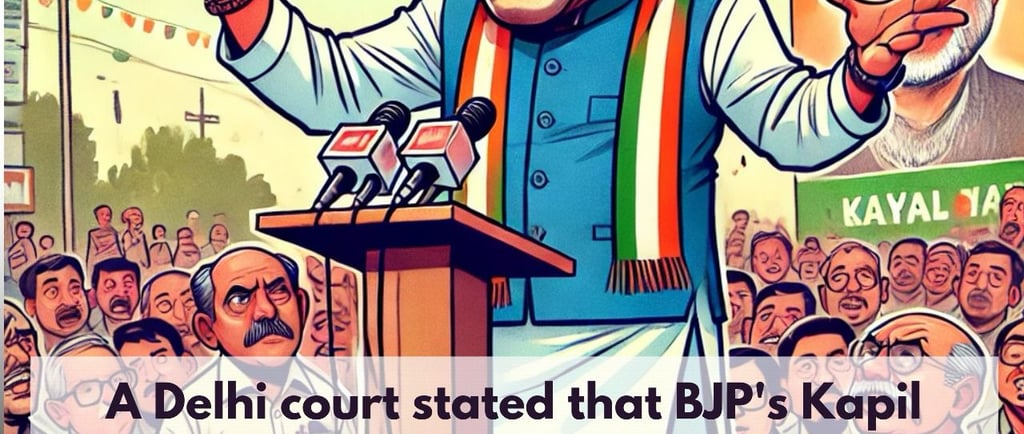A Delhi court stated that BJP's Kapil Mishra used the term "Pakistan" to incite hatred during his election campaign.
On March 7, a Delhi court rejected BJP leader Kapil Mishra's plea challenging a trial court's decision to summon him in a case related to alleged communal remarks made during the 2020 Delhi assembly polls. Mishra's controversial statements, posted on his social media, included phrases like “Delhi will become mini-Pakistan” and “Shaheen Bagh will serve as entry for Pakistan.” He was charged under Section 125 of the Representation of People Act for promoting enmity to gain electoral advantage. Mishra had argued that his words did not target any specific religious group, but the court disagreed, stating that the term "Pakistan" is commonly associated with a particular religion. The judge stated that Mishra's remarks seemed intended to provoke religious division and stir hatred for political gain.
3/9/20252 min read


Website
On March 7, a Delhi court dismissed a plea filed by Bharatiya Janata Party (BJP) leader Kapil Mishra, challenging a lower court's decision to summon him in connection with an electoral malpractice case. The case involves allegations that Mishra made communal remarks during the 2020 Delhi Assembly elections in an attempt to influence voters. The court, led by Special Judge Jitendra Singh, upheld the trial court's decision, refusing to set aside the summons.
The controversy revolves around statements Mishra made on his social media accounts, which included highly charged phrases like “Delhi mein chote chote Pakistan bane” (“Delhi will become mini-Pakistan”) and “Shaheen Bagh mein Pak ki entry” (“Shaheen Bagh will serve as entry for Pakistan”). These remarks were widely criticized for potentially inciting religious tensions, as they appeared to link certain areas and communities in Delhi with Pakistan in a negative light.
As a result of these comments, Mishra was charged under Section 125 of the Representation of People Act, 1951 (RP Act), which prohibits the promotion of enmity between different classes of people for the purpose of securing electoral advantage. The section specifically addresses actions that could disturb communal harmony and public order during elections.
In June 2024, Mishra was summoned by the Additional Chief Metropolitan Magistrate to face charges related to these remarks. The summons was part of an ongoing investigation into the possible violation of laws governing electoral conduct and the promotion of communal hatred.
On March 7, Mishra's revision plea was heard by Special Judge Jitendra Singh at the Rouse Avenue Courts. The judge rejected Mishra’s arguments, noting that the use of the term "Pakistan" in his statements could be understood as a reference to a particular religious community, especially considering its frequent association with Muslim identity in popular discourse. Mishra had argued that his words did not target any specific religious group and should not be seen as promoting enmity. However, Judge Singh disagreed with this interpretation.
The court noted that the word 'Pakistan' is often used to evoke associations with a specific religion, particularly Islam. Singh remarked that Mishra’s statements appeared to be a deliberate attempt to foster religious hostility by indirectly referring to a country that, in common parlance, is frequently linked to a particular religious group. The court emphasized that such remarks were made with the apparent intent of stoking communal tension and division for electoral gains.
The judge further criticized Mishra for using the word “Pakistan” in a manner that could contribute to communal polarization during an election campaign. The court observed that such statements, if left unchecked, could incite hatred and division within society, undermining public peace and harmony, particularly in a highly sensitive electoral context.
With this ruling, Mishra’s challenge to the trial court’s summons was dismissed, and he will have to face the charges in the ongoing case. The decision underscores the importance of ensuring that political discourse remains respectful and does not incite hatred or division based on religion or community, especially during elections. The case continues to be a significant point of discussion in the broader context of electoral conduct and communal harmony in India.
